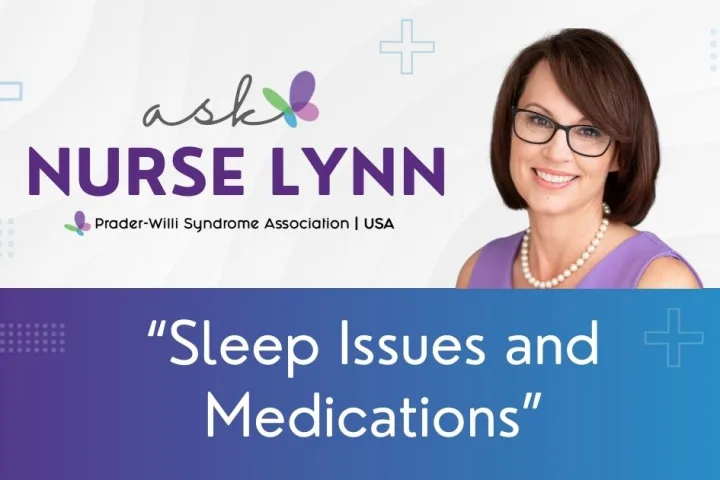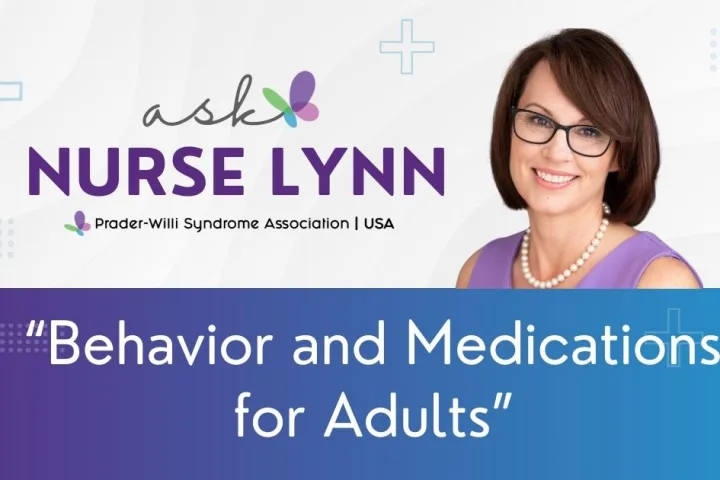Question:
Female, 69 years old, unknown subtype
I am guardian for my sister who will be 69!
It’s been a rough road for my parents since there was little knowledge about PWS. She currently lives with a SLP caregiver and they are a Godsend. While she has a host of typical PW physical challenges, the most recent is aspiration pneumonia. Next step is gtube, it appears. I’m concerned about surgery and her acceptance of not tasting the food. Do you know of other individuals that have tube feeding as adults? BTW, she is non ambulatory and unable to feed herself. She has been on pureed for about a year with thickened (honey thickened) for about a year. Her caregivers are meticulous about her care in every aspect so I know they take great care in feeding. Would appreciate your knowledge on this next step we must decide on.
Nurse Lynn’s Response:
Living to this age with PWS shows the incredible love, dedication, and excellent care your family and her caregivers have provided. Feeding tubes are not very common in adults with PWS, since most people who need them usually get them as babies. But in some older adults who have trouble swallowing safely or who keep getting pneumonia from food going into their lungs, a feeding tube can sometimes be the safest and best option.
A G-tube can bring important benefits. It can lower the chances of food or liquid going into the airway, make sure she gets enough nutrition and hydration, and ease the stress and worry that mealtimes may cause for both her and her caregivers. At the same time, there are risks. Surgery and anesthesia can be harder on older adults with PWS, especially if they have weak muscles, breathing problems, or scoliosis. Problems such as infection, pulling at the tube, or slow healing can also happen more often in older people, though these issues can often be managed with proper training and careful care. Because many people with PWS pick at their skin, if she has a history of this, there may be added risk of infection or pulling at the tube site. Caregivers can be trained in ways to protect the area and reduce picking behaviors, but it’s important to plan for this ahead of time. It’s also worth noting that while a G-tube may reduce the risk of aspiration pneumonia, it cannot completely prevent it, since saliva or stomach reflux can still cause problems.
Families often worry that a person with PWS will be upset about not tasting food anymore. The encouraging news is that some adults with PWS have adjusted very well to G-tube feedings, especially when their care team explains the process and includes them in it. In some cases, people find comfort in watching their feedings go through the tube or by having a special routine with staff during feeding times. This can give them a sense of control and turn the experience into something positive and social.
In the end, deciding about a G-tube is very personal. It is reassuring to know that her current providers and caregivers are skilled and consistent in their approach, which means she would have the support she needs if a G-tube is placed.
Do you have a non-emergency medical question for Nurse Lynn? Submit your question here:
Share this!





 Perry A. Zirkel has written more than 1,500 publications on various aspects of school law, with an emphasis on legal issues in special education. He writes a regular column for NAESP’s Principal magazine and NASP’s Communiqué newsletter, and he did so previously for Phi Delta Kappan and Teaching Exceptional Children.
Perry A. Zirkel has written more than 1,500 publications on various aspects of school law, with an emphasis on legal issues in special education. He writes a regular column for NAESP’s Principal magazine and NASP’s Communiqué newsletter, and he did so previously for Phi Delta Kappan and Teaching Exceptional Children. Jennifer Bolander has been serving as a Special Education Specialist for PWSA (USA) since October of 2015. She is a graduate of John Carroll University and lives in Ohio with her husband Brad and daughters Kate (17), and Sophia (13) who was born with PWS.
Jennifer Bolander has been serving as a Special Education Specialist for PWSA (USA) since October of 2015. She is a graduate of John Carroll University and lives in Ohio with her husband Brad and daughters Kate (17), and Sophia (13) who was born with PWS. Dr. Amy McTighe is the PWS Program Manager and Inpatient Teacher at the Center for Prader-Willi Syndrome at the Children’s Institute of Pittsburgh. She graduated from Duquesne University receiving her Bachelor’s and Master’s degree in Education with a focus on elementary education, special education, and language arts.
Dr. Amy McTighe is the PWS Program Manager and Inpatient Teacher at the Center for Prader-Willi Syndrome at the Children’s Institute of Pittsburgh. She graduated from Duquesne University receiving her Bachelor’s and Master’s degree in Education with a focus on elementary education, special education, and language arts. Evan has worked with the Prader-Willi Syndrome Association (USA) since 2007 primarily as a Crisis Intervention and Family Support Counselor. Evans works with parents and schools to foster strong collaborative relationships and appropriate educational environments for students with PWS.
Evan has worked with the Prader-Willi Syndrome Association (USA) since 2007 primarily as a Crisis Intervention and Family Support Counselor. Evans works with parents and schools to foster strong collaborative relationships and appropriate educational environments for students with PWS. Staci Zimmerman works for Prader-Willi Syndrome Association of Colorado as an Individualized Education Program (IEP) consultant. Staci collaborates with the PWS multi-disciplinary clinic at the Children’s Hospital in Denver supporting families and school districts around the United States with their child’s Individual Educational Plan.
Staci Zimmerman works for Prader-Willi Syndrome Association of Colorado as an Individualized Education Program (IEP) consultant. Staci collaborates with the PWS multi-disciplinary clinic at the Children’s Hospital in Denver supporting families and school districts around the United States with their child’s Individual Educational Plan. Founded in 2001, SDLC is a non-profit legal services organization dedicated to protecting and advancing the legal rights of people with disabilities throughout the South. It partners with the Southern Poverty Law Center, Protection and Advocacy (P&A) programs, Legal Services Corporations (LSC) and disability organizations on major, systemic disability rights issues involving the Individuals with Disabilities Education Act (IDEA), Americans with Disabilities Act (ADA), and the federal Medicaid Act. Recently in November 2014, Jim retired.
Founded in 2001, SDLC is a non-profit legal services organization dedicated to protecting and advancing the legal rights of people with disabilities throughout the South. It partners with the Southern Poverty Law Center, Protection and Advocacy (P&A) programs, Legal Services Corporations (LSC) and disability organizations on major, systemic disability rights issues involving the Individuals with Disabilities Education Act (IDEA), Americans with Disabilities Act (ADA), and the federal Medicaid Act. Recently in November 2014, Jim retired.